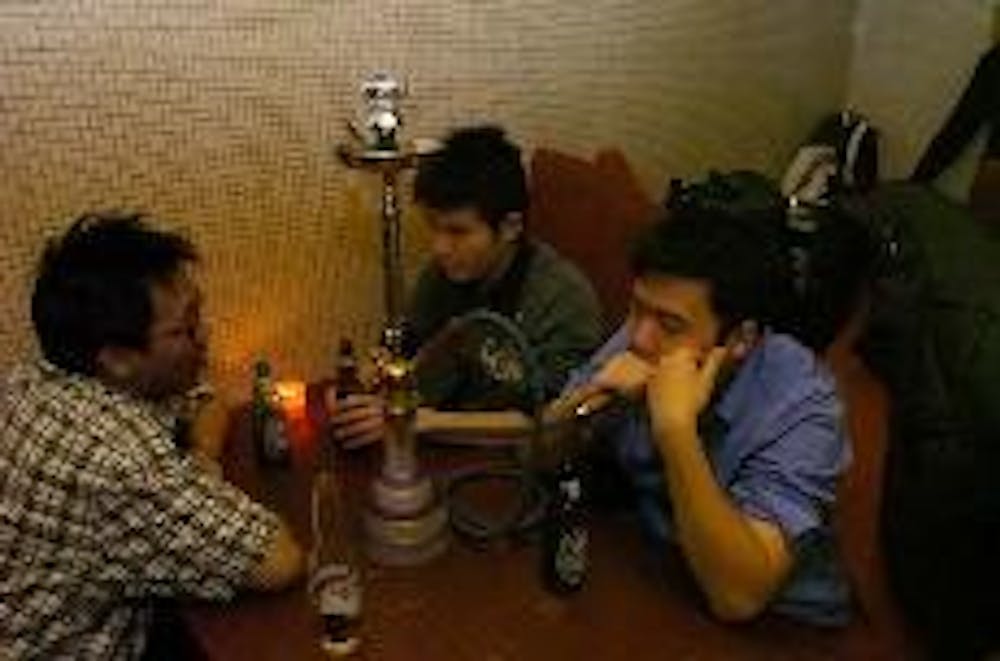
Walk past the field outside Harrison College House late one night and you might see a crowd of people circled around a hookah, with Aman Agarwal passing the hose to his left.
College students like Agarwal, a Wharton and Engineering sophomore from India, are increasingly smoking hookahs as a way to relax and socialize.
Even during the middle of the night, Agarwal said, he and his friends brave the cold - smoking is prohibited inside college houses - to sit outside and talk about "college life."
But the trend isn't limited to students - overall hookah use is increasing significantly, according to Dia Sawan, owner of Byblos Restaurant and Bar, just off Rittenhouse Square.
Sawan, whose restaurant serves hookahs all day long, calls hookah use a "new [and] cool thing to do."
The dimly-lit Byblos Restaurant fosters a relaxing atmosphere for smoking hookahs: Customers sprawl out on sofas in front of a table holding a hookah and drinks into the early hours every night of the week.
On a Friday or Saturday night, the restaurant serves more than a hundred hookahs, and hookah service accounts for more than 20 percent of the restaurant's overall revenue, Sawan said.
Hookahs, which originated in India, are tall pipes designed for smoking a kind of tobacco known as "shisha," which comes in flavors like apple and vanilla.
Many are made of glass and stainless steel, and are often intricately designed and ornately decorated - sometimes featuring lavish accoutrements like fur.
Wonderland, a local smoke shop, sells models ranging in size from 14 to 36 inches, some with as many as three hoses coming off the device. They cost between $90 and $235.
"Since hookah bars have started opening in town, they've definitely become a much more popular item," said Bill, an employee at the store who refused to give his last name for privacy reasons.
The store sells between three and five hookahs per week, he said.
Their appeal, Agarwal said, comes from the smooth taste of the tobacco, which is purified by the water in the base of the device.
Hookah smokers fill the top of their devices with tobacco - or any other substance they choose - and, as they inhale through the hose, smoke is drawn downward and passes through the water in the base; it then travels up the shaft and through the hose.
College sophomore Brandon Paroly offered an explanation for hookah's growing popularity.
"It's social and it's legal, so it's convenient," he said.
The social factor makes hookahs different from cigarettes, cigars or pipes, which Paroly said are pastimes only enjoyed by individuals.
"Nobody really passes around cigars - you wouldn't sit in a circle passing it around, taking drags," he added.
"In the Middle East, every restaurant has" hookahs, Sawan said. "After you eat, you smoke it - dessert, fruit and hookah."
At Penn, Paroly said, a lot of students are exposed to it because they have Jewish or Middle Eastern backgrounds, and, "at the end of a long party night, those kids will bring out the hookahs."
Many American military servicemen also discover hookahs during their tours in countries like Iraq and Jordan, and continue smoking once they return home, Sawan said, adding that some of them frequent his hookah bar.
In addition to Byblos, hookahs are served at other area restaurants such as London Grill, Shouk & Sheesa Lounge, and Fez.
And as more and more people get exposed to the hookah craze, they can't help but join in.
"It's relaxing, in a good way," said College sophomore Noah Polsky. "Everyone circles around it and chats - it brings people together."
The Daily Pennsylvanian is an independent, student-run newspaper. Please consider making a donation to support the coverage that shapes the University. Your generosity ensures a future of strong journalism at Penn.
DonatePlease note All comments are eligible for publication in The Daily Pennsylvanian.




